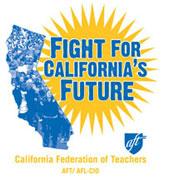Topic: Education Funding
Crisis in the classroom: California confronts teacher shortage
Poor working conditions, modest pay, and teacher bashing exact a toll
A decade of bashing teachers has left California and the nation with a dire shortage. Demand for K-12 teachers has increased while the new teacher supply is at a 12-year low.
Enrollment in California’s teacher preparation programs has dropped by 76 percent over the last decade, far below what is needed to fill vacancies, according to Linda Darling-Hammond, faculty director at the Stanford Center for Opportunity Policy in Education.
Higher education should be free…and it’s within our reach
Candidates don’t go far enough; social movement needed to force issue
Bernie says higher education should be free. Hillary says students should be debt-free when they graduate. Bob Samuels, president of the University Council-AFT, welcomes this debate, but says neither Democratic presidential candidate goes far enough.
San Diego piloting move to make community college free
Can the goals of California’s Master Plan for Higher Education be fulfilled again?
The San Diego Community College District has joined the states of Tennessee and Oregon in implementing free community college. In February Chancellor Constance Carroll announced that 200 students would have their course fees waived for the 2016-17 academic year.
Why did the university refuse $25 million in state funding?
UC dependence on high out-of-state enrollment fees is promoting inequality
Top University of California administrators made headlines in August when they declined the offer by state legislators to provide the system an additional $25 million. The offer was contingent on the university accepting another 5000 in-state resident students.
Prop. 30 delivers salary relief in recent contracts
After years of stagnant wages, classified employees are finally seeing long-overdue salary relief in recent months.
The raises largely result from the CFT campaign two years ago to pass Proposition 30. This year, the governor’s budget included $5.6 billion in additional funding for K-14 education. Prop. 30 will generate an average of about $6 billion per year for seven years.
University of California fails to solve campus funding inequities
Influx of non-resident tuition income outstrips new rebenching funds
Two years ago, the University of California system changed the way it distributes state funds and tuition revenue to the campuses. In the past, all tuition dollars and state dollars were sent to the Office of the President and redistributed according to unknown formulas.
California districts roll out LCAPs to mixed reviews
Degree of teacher and classified input to local plans varies widely
Ray Gaer sees the Local Control Accountability Plan, or LCAP, as “a different forum for unions to talk about things that matter and an opportunity to build more cooperative relationships. The president of the ABC Federation of Teachers says, “We can talk about how programs are selected and developed and how money is spent before getting to the bargaining table.”
Local Control Funding Formula: New regulations specify use of funds for targeted students
On January 16, the State Board of Education adopted emergency spending regulations for the supplemental and concentration grant funds that Local Educational Agencies (districts, county offices of education and some charter schools) will receive under the Local Control Funding Formula.
CFT campaigns to bring back nurses, libraries
Union-sponsored legislation inspired by labor-community vision
The CFT has launched an ambitious legislative initiative for K-12 schools called Healthy Kids, Healthy Minds, which is embodied in the new union-sponsored bill, AB 1955, carried by Richard Pan, D-Sacramento, a pediatrician with a track record of improving health in local neighborhoods.
Proposition 30 leads way to fiscal recovery
Public school educators face a new threat in the form of the Vergara v. California lawsuit, which aims to declare unconstitutional five provisions of the Education Code that ensure seniority, due process and other rights for K-12 teachers.
Historic funding change includes district accountability plans
The new Local Control Funding Formula brings significant opportunities for educators and their unions
Under the LCFF, the governing boards of districts, county offices of education and charter schools, known as Local Education Agencies, are required to adopt a Local Control Accountability Plan every three years starting in July 2014.
Berkeley cooking and gardening program seeks funding
Community support saved an innovative cooking and gardening program that faced closure last spring, but only leftovers remain after the Berkeley Unified School District cut two-thirds of the budget.
“Even the chickens in the garden were given away because no one was left to tend them,” said Daria Wrubel of the Berkeley Council of Classified Employees. Wrubel taught gardening to 450 students at Thousand Oaks Elementary before she and more than half the classified staff were cut.
Prop. 30 brings bounty of classes for students, part-timers
The passage of Proposition 30 in November of 2012 has been a boon to part-time faculty at Citrus College in Glendora, beginning with the winter term and continuing uninterrupted into this fall.
Dawn of new era for K-12 education funding
Local decisions drive plan; difficult bargaining looms
For the first time in six long years, the state budget includes more funding for education in 2013-14. In the on-time budget, Gov. Brown fended off legislative demand to reinstate programs cut during the recession and stayed true to his commitment to prioritize education funding. Though the sectors of education fared differently, all saw at least some increase in state funding.
Berkeley local unions fight for fair contract, cooking and gardening program
The faculty and classified AFT local unions in the Berkeley Unified School District rallied on May 8 before a district board meeting. With state funding to the district on the rise, educators say the district can provide more for its employees, especially since it is holding $7.9 million in its ending fund balance.
The workers are also trying to save the successful cooking and gardening program threatened by cuts to the federal program, Network for Healthy Californians.
Federal cuts threaten cooking and gardening classes
Berkeley community rallies to save famous kids’ grow-it-yourself program
Facing a massive loss of federal funds, Berkeley Unified officials may yank an innovative gardening and cooking program up by the roots. The slash and burn tactics are drawing widespread community fire.
For about 15 years, the U.S. Dept. of Agriculture has taught low-income families about nutrition through school programs like the Network for a Healthy California. Congress, however, has revised its funding formula and California, which used to receive nearly a third of all USDA money, will lose about 40 percent of its grant. The funding for direct-to-kids programs like the NHC will be shifted to local health agencies to run publicity campaigns.
Prop. 30 victory helps save part-time teaching jobs
Instructors, students and others committed to quality public education in California breathed a sigh of relief with the passage of Proposition 30, the ballot measure that will bring increased revenue to public education and other services through temporary progressive taxation.
Classified rise to the challenge of passing Prop. 30
Threat of more furlough days spurs community outreach and response
Classified employees had a lot to lose if voters rejected Prop. 30 on November 6. Staff swung into action across California, racking up victories in state and local campaigns that will go a long way toward saving public education.
Gilroy paraprofessionals in AFT Local 1921, for example, resisted pressure to take 10 furlough days until the need was clear, even though district teachers represented by CTA and classified employees represented by CSEA had agreed beforehand to give up the days.
The Fight for California’s Future
Our campaign for better education funding and fair taxation
With the passage of Proposition 30 in the November 2012 election, California is finally looking at improved prospects. Prop 30 begins the process of reversing the massive redistribution of wealth upwards that has taken place over the past thirty years. By imposing a 1–3% increase on the wealthiest Californians’ income taxes, and a modest sales tax increase of one-quarter of 1%, the state budget will gain some relief and programs in education and social services will not face further savage cuts.
Yes on Prop. 30: Tax the wealthy to raise money for schools and colleges
In the last four years, our schools and colleges have been hit with $20 billion in cuts, have lost 30,000 faculty members, and now have class sizes that are among the largest in the country.




